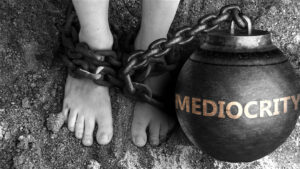Blog

Tired of Settling? How to Light Your Life and Work on Fire
Settling for “good enough” instead of what you really want? Getting comfortable with the ordinary? Letting others treat you poorly? Suffering through a poor work situation? Tired of working with people who don’t want to excel or don’t share your values? Playing small, even though you know there’s something bigger possible for you? Time out. This is your life. Your one and only life, with an uncertain duration and no guarantees. Time to take it back. “There is no passion to be found playing small—in settling for a life that is less than the one you are capable of living.”

The Problem of Going It Alone
One of the silver linings of the covid-19 pandemic was what it reminded us about our longing for relationship, for connection, for human touch. What was suddenly stolen was dearly missed and now cherished. We see the problem of going it alone. Close connection with family and friends and a sense of belonging are the most important building blocks of a life well lived. Yet today we have forces driving us apart. One is a culture of excessive individualism and egocentric living, a sense that life is all about us. It’s the trap of being self-absorbed and caught up in

Feeling Behind? It May Be a Trap
Feeling behind? Have an anxious feeling that others are racing ahead while you’re lagging? This is more common than we think: Feeling behind in school Feeling behind in knowing what we want to major in, or do with our lives Feeling behind in internship or job searches Feeling behind in the prestige of the jobs we take or the organizations we work for, or how quickly we’re climbing the ladder At the heart of it for many is a pressure to prove something, and needless suffering caused by social comparison and status anxiety. It’s a toxic combination of what author

Choice Overload and Career Transitions
We all face transitions in life and work. The transition from school to work. From one job or career to another. To marriage and family. Or a new home. To midlife. Or retirement. So we need to get good at transitions. And that depends on getting good at making choices. Like: What’s next? Sometimes we get bogged down in choice overload. What to do when facing career change choice overload? The Paradox of Choice Psychologist Barry Schwartz calls it the “paradox of choice.” He argues that the freedom to choose is one of the main roots of unhappiness today. Choice

Back to Normal? Not So Fast
In fortunate parts of the world, there’s a palpable sense of relief and celebration as life begins to get back to normal after a brutal pandemic year. In some quarters, there’s jubilation—and rightly so after so many shocks to so many for so long. And of course the pandemic rages on, with so many people suffering, struggling, recovering, mourning, and more. But back to normal? Not so fast. We sense, beneath the surface, that this is an opportunity to revisit and reinvent. Surely there are some things we just want to bring back—things we missed. But we should be wary

Tips for New Graduates on Life, Work, and Making Big Decisions
With graduation season upon us, new graduates have much to celebrate after navigating a brutal year. Now they face a big transition from school to work (or further school, or gap year, or other pursuits). Here are tips to help them craft their life and work–and make big decisions that will serve them well. Your work now is to find your work. Don’t commit prematurely to the first path you walk. Don’t over-invest in or over-identify with a professional area without having pressure-tested the reality of it against your initial conception of it. Don’t satisfice. Create an intentional process for

The Comparison Trap
We all fall into traps in life. One of the most common is the comparison trap: constantly comparing ourselves to others and judging our worth by how we stack up—mostly on things that are superficial and unimportant: Where do I live? What do I drive? How much do I make? Where do I fall in the social hierarchy? According to researchers, this kind of comparative thinking is common: “…the urge to make comparisons is strong. Our research has found that more than 10% of daily thoughts involved making a comparison of some kind.” -Dr. Amy Summerville, “Is Comparison Really the

The Urgency of Sustainable Leadership—and the Promise of Social Entrepreneurship
On this Earth Day, we honor our planet and recognize the importance of climate action and environmental stewardship. We acknowledge our interdependence—and the gravity of the stakes if we fail to meet the moment. What is the role of business in this epic challenge? Of leaders and entrepreneurs? Of all of us? The Role of Business Business leaders of course must address cash, profits, and growth as they manage their venture’s financial health amidst market pressures. Thankfully, there are not just costs associated with environmental stewardship but real opportunities. “For far-sighted companies, the environment may turn out to be

Are You Drifting through Life?
“Let us consider the way in which we spend our lives.” -Henry David Thoreau How did I get here? Is this what I wanted for my life? Is this what I chose? Life can be messy. Many of us go long stretches of our lives on autopilot. We sleepwalk through our days. “It is remarkable how easily and insensibly we fall into a particular route, and make a beaten-track for ourselves.” -Henry David Thoreau The Trap of Drifting through Life One of the common traps of living is drifting: getting carried along by the current of outside influences, without

Why Conflict Is Good–And How to Manage It
Do you know how to manage conflict well? Most people avoid conflict. Why? There are many reasons, with fear at the heart of them all: Fear of tension Fear of hurting others Fear of rejection Fear of escalation of tough issues Fear of a break in the relationship Fear of an unexpected outcome, perhaps tougher to manage Fear of being viewed as a troublemaker Fear of retaliation Fear of having to deal with difficult consequences These fears are understandable. So we end up avoiding it like the plague. “In my work with leaders and their teams, I’ve discovered that a

Guard Your Heart
All the turmoil of the pandemic reminded us of how important it is to guard our heart. Here we mean our metaphysical heart, our sacred center. Author and educator Parker Palmer said it beautifully: “I’m using the word ‘heart’ as they did in ancient times, when it didn’t merely mean the emotions, as it tends to mean today. It meant that center in the human self where everything comes together—where will and intellect and values and feeling and intuition and vision all converge. It meant the source of one’s integrity.” So many of us these days have suffered anxieties, losses,

Are You Playing the Long Game?
These days it’s easy to fall into the trap of playing the short game. Our culture is geared toward it. With our devices, we’re developing the attention span of a gnat. We swipe and scroll. We get fidgety with a few seconds of down-time. The power of the long game is astonishing, but the short game is alluring. We see it in many realms. We see it in business. Harvard Business School professor Clayton Christensen noted, “If you study the root causes of business disasters, over and over you’ll find a predisposition toward endeavors that offer immediate gratification.”

Designing Your Work for Flow
We’ve all heard of flow—that remarkable state of being in the zone and operating at our best. Many of us have experienced it. But what exactly is it? And how do we get into it? Have you experienced flow at work? First, we note that the deep concentration and absorption associated with flow is becoming much harder to attain these days with all our alluring devices and their dopamine-driving distractions. Just when we need it most, it’s becoming more and more elusive. Complete Absorption Mihaly Csikszentmihalyi, a psychology professor now at Claremont Graduate University, has dedicated much of his life

Leadership and Psychological Safety in Teams
The problems in far too many organizations today are legion: Unproductive, boring meetings Astonishing amounts of wasted time Avoidance of sensitive issues Lack of full engagement Reluctance to provide candid, constructive feedback Political games and hidden agendas Sound familiar? The effects are far-reaching, from low quality work to employee turnover. According to a Corporate Executive Board study: “Nearly half of all executive teams fail to receive negative news that is material to firm performance in a timely manner because employees are afraid of being tainted by the bad news,” and only “19% of executive teams are always promptly informed of bad

Founder-Venture Fit for Entrepreneurs
With startups, many people focus on what entrepreneur and investor Marc Andreessen calls “product/market fit”: “being in a good market with a product that can satisfy that market.” It’s a great point, and too many ventures fail or founder because they never find it. But not nearly enough attention is paid to what I call “founder-venture fit”: when the venture matches well with the founder’s (or co-founders’) knowledge, strengths, passions, and values. Some have written about similar ideas—“founder-market fit” or “founder fit”—but too many aspiring entrepreneurs miss this critical point. Serial entrepreneur and investor Brad Feld wrote: “I’ve come to

